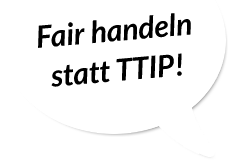Agriculture MEPs to US Secretary Vilsack: TTIP must respect EU standards and be mutually beneficial
Transatlantic Trade and Investment Partnership (TTIP) talks on agricultural aspects will be tough but should focus on equivalent ways to achieve common goals, rather than pushing for identical standards, U.S. Secretary for Agriculture Tom Vilsack told EP's Agriculture committee on Monday. While many MEPs agreed that TTIP can and must be mutually beneficial they insisted that EU's standards and protection of its geographical indications (GIs) must not be undermined.
"There are benefits to both the United States and to Europe in TTIP," Secretary Vilsack said. He recognised that "there are serious challenges" but stressed that "trade agreements have a critical role to play" in "mutual responsibilities relative to global food security."
Equivalent rather than identical
"We approach food safety in a slightly different way" with "the same potential outcome which is safe food for consumption,” said Mr Vilsack. He also drew parallels between geographical indication rules in Europe and trademarks in the US, saying both systems tried to provide protection.
"It is not really ultimately about getting identical systems, it is about getting equivalent systems. The goal is the same: an adequate supply of food that is produced in a sustainable way, that is safe for consumption, and that meets the needs of our people," he added.
Mutually beneficial
Many MEPs in the following debate called for a balanced and mutually beneficial deal. "I am in favour of an agreement with the United States but we need the right conditions," stressed Albert Dess (EPP, DE). "We have serious discussions ahead of us but (...) I would stress the need to step up talks to get this free trade deal done" as "there are benefits to be had on both sides of the Atlantic," agreed Jens Rohde (ALDE, DK).
"One thing I don't want is the agri-food sector becoming a bargaining chip," said James Nicholson (ECR, UK). "We all have our offensive and defensive positions but there is a lot to be gained for everybody", he added calling for a "firm balanced deal" that would be able to "withstand protests."
EU geographical indications would benefit US consumers too
Many MEPs insisted that the EU's quality system of geographical indications, which provides guarantees to consumers that certain foodstuffs have been produced in a given region, must be ensured in the future TTIP agreement for benefits of both EU and US consumers.
"Don't you think that a clear system of labelling would be good for American consumers?" Paolo De Castro (S&D, IT) asked Mr Vilsack. "That would mean that American consumers would no longer have to consume products believing that they are Italian, French, Greek or whatever while they were actually produced in the United States," Mr De Castro explained. The call for "clear labelling rules, especially for GIs, so that consumers have a choice at the end of the day," was also echoed by Martin Häusling (Greens/EFA, DE).
US's commitment to free trade questioned
Several MEPs criticised existing or potential future measures that make it difficult for EU farmers to reach US market. "It is a bit difficult not to question America's commitment to free trade when it hits the EU dairy industry with increased duties on EU butter and cream exports," Mr Rohde said. Mr Dess opposed the member state specific import licence system in the potential trade agreement, which does not treat the EU as one entity, even though all producers are subject to the same EU food safety standards. "I can imagine higher limits being laid down but an import licence system is not a way forward," he said.
Diverging views on GMOs, cloning, hormone-treated meat and antibiotics
But several MEPs insisted that the American and the European agricultural model are hard to reconcile and EU farmers and consumers could end up on a losing side. "American agriculture will be the main profiteer of this agreement," warned Mr Häusling. He pointed out that when it comes to the use of gene technology, hormone-treated meat, labelling of clones, EU consumers "have a different opinion" and "we [legislators] have to take on board what consumers want."
"We are not at all convinced in Britain that the American standards in terms of health and welfare are as good as British standards," said John Stuart Agnew (EFDD, UK). He also pointed out to diverging view on the use of antibiotics and different definitions, for example of "free range eggs" on both sides of Atlantic. "Who is going to win this battle? Because if you win, our free range eggs sector is going to be massively undermined," he said.
TTIP and solving global food security problems
Lidia Senra Rodríguez (GUE/NGL, ES) questioned Mr Vilsack's claim that TTIP would contribute to global food security. "You said that you wanted to feed the Asian middle-class. Well I imagine that Asian farmers want to do the same (...) to feed their people," she said.
Background
European Parliament adopted in July this year a non-legislative resolution with its recommendations to European Commission's TTIP negotiators. MEPs in the approved text insisted on "strong legal protection of EU geographical indications" and stressed that there can be "no agreement" in areas where the EU and the US have "very different" standards, such as "GMOs, the use of hormones in the bovine sector (...) and the cloning of animals."
A TTIP deal, once drawn up by EU and US negotiators, would need the backing of the European Parliament and the EU Council to enter into force.
Monday, 30 November 2015
Committee on Agriculture and Rural Development
In the chair: Czesław Adam Siekierski (EPP, PL)
Schlagwörter
- Artikel teilen
- Zum Seitenanfang

